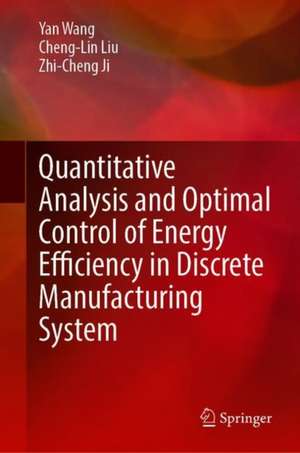Quantitative Analysis and Optimal Control of Energy Efficiency in Discrete Manufacturing System
Autor Yan Wang, Cheng-Lin Liu, Zhi-Cheng Jien Limba Engleză Hardback – 2 iun 2020
This book provides energy efficiency quantitative analysis and optimal methods for discrete manufacturing systems from the perspective of global optimization. In order to analyze and optimize energy efficiency for discrete manufacturing systems, it uses real-time access to energy consumption information and models of the energy consumption, and constructs an energy efficiency quantitative index system. Based on the rough set and analytic hierarchy process, it also proposes a principal component quantitative analysis and a combined energy efficiency quantitative analysis.
In turn, the book addresses the design and development of quantitative analysis systems. To save energy consumption on the basis of energy efficiency analysis, it presents several optimal control strategies, including one for single-machine equipment, an integrated approach based on RWA-MOPSO, and one for production energy efficiency based on a teaching and learning optimal algorithm. Given its scope, the book offers a valuable guide for students, teachers, engineers and researchers in the field of discrete manufacturing systems.
| Toate formatele și edițiile | Preț | Express |
|---|---|---|
| Paperback (1) | 944.67 lei 43-57 zile | |
| Springer Nature Singapore – 2 iun 2021 | 944.67 lei 43-57 zile | |
| Hardback (1) | 950.66 lei 43-57 zile | |
| Springer Nature Singapore – 2 iun 2020 | 950.66 lei 43-57 zile |
Preț: 950.66 lei
Preț vechi: 1159.34 lei
-18% Nou
Puncte Express: 1426
Preț estimativ în valută:
181.91€ • 190.41$ • 151.41£
181.91€ • 190.41$ • 151.41£
Carte tipărită la comandă
Livrare economică 31 martie-14 aprilie
Preluare comenzi: 021 569.72.76
Specificații
ISBN-13: 9789811544613
ISBN-10: 9811544611
Ilustrații: XXIV, 272 p. 96 illus., 49 illus. in color.
Dimensiuni: 155 x 235 mm
Greutate: 0.59 kg
Ediția:1st ed. 2020
Editura: Springer Nature Singapore
Colecția Springer
Locul publicării:Singapore, Singapore
ISBN-10: 9811544611
Ilustrații: XXIV, 272 p. 96 illus., 49 illus. in color.
Dimensiuni: 155 x 235 mm
Greutate: 0.59 kg
Ediția:1st ed. 2020
Editura: Springer Nature Singapore
Colecția Springer
Locul publicării:Singapore, Singapore
Cuprins
Introduction.- Quantitative analysis of real-time access to energy consumption information.- Energy consumption integration model for discrete manufacturing systems.- Construction of energy efficiency quantitative index system for discrete manufacturing system.- Combined energy efficiency quantitative analysis based on rough Set and analytic hierarchy process.- Energy efficiency quantitative analysis based on principal component analysis.- Design and development of quantitative analysis systems.- Energy saving optimization control of single machine equipment.- Integrated Energy Efficiency Optimization Control Based on RWA-MOPSO.- Production energy efficiency optimization control based on teaching and learning algorithm.
Notă biografică
Yan Wang received her Ph.D. degree from Nanjing University of Science and Technology, China, in 2006. She is currently a professor at the School of Internet of Things Engineering, Jiangnan University, China. Her research interests include Energy-Efficient Control of Complex Manufacturing System, Industrial Networked System, and Evolutionary Computing.Cheng-Lin Liu received his Ph.D. degree from Southeast University, China, in 2008. He is currently a professor at the School of Internet of Things Engineering, Jiangnan University, China. His research interests include Coordination Control of Multi-agent Systems and Distributed Control of Networked Systems.
Zhi-Cheng Ji received his Ph.D. degree from China University of Mining and Technology, China, in 2004. He is currently the vice president of Jiangnan University.
Zhi-Cheng Ji received his Ph.D. degree from China University of Mining and Technology, China, in 2004. He is currently the vice president of Jiangnan University.
Textul de pe ultima copertă
This book provides energy efficiency quantitative analysis and optimal methods for discrete manufacturing systems from the perspective of global optimization. In order to analyze and optimize energy efficiency for discrete manufacturing systems, it uses real-time access to energy consumption information and models of the energy consumption, and constructs an energy efficiency quantitative index system. Based on the rough set and analytic hierarchy process, it also proposes a principal component quantitative analysis and a combined energy efficiency quantitative analysis.
In turn, the book addresses the design and development of quantitative analysis systems. To save energy consumption on the basis of energy efficiency analysis, it presents several optimal control strategies, including one for single-machine equipment, an integrated approach based on RWA-MOPSO, and one for production energy efficiency based on a teaching and learning optimal algorithm. Given its scope, the book offers a valuable guide for students, teachers, engineers and researchers in the field of discrete manufacturing systems.
Caracteristici
Focuses on quantitative analysis and optimal control of energy efficiency in discrete manufacturing systems Proposes applicable methods to study the issues of energy efficiency quantitative analysis and integrated energy efficiency optimization control Presents new research findings that could serve as benchmark solutions for future research
